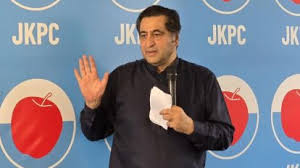After Jamaat-e-Islami ex-chiefs distance themselves from his new alliance, Sajad Lone lashes out — ‘Know who’s behind it’

Sajad Lone Slams Critics After Jamaat-e-Islami Ex-Leaders Reject His Alliance: “We Know Who’s Behind It”
In a surprising political turn in Jammu and Kashmir, Sajad Gani Lone, chief of the Jammu & Kashmir People’s Conference (JKPC), found himself in the spotlight. His newly announced alliance faced backlash after several former Jamaat-e-Islami (JeI) leaders publicly distanced themselves from it. Lone, clearly frustrated, responded strongly, saying, “We know who’s behind it.”
A New Alliance With Bold Goals
On June 30, Lone launched the People’s Alliance for Change (PAC). This coalition brought together his JKPC, Hakim Mohammad Yasin’s People’s Democratic Front, and the Justice & Development Front (JDF). The goal was clear—restore Jammu and Kashmir’s special status under Articles 370 and 35A and push for full statehood through democratic means.
This move aimed to bring together voices that had been sidelined in Kashmir’s changed political landscape. Lone hoped it would give people a platform that wasn’t entirely pro-Delhi or rooted in past separatist sentiment.
Immediate Backlash
However, the announcement triggered a wave of criticism. Several former leaders of Jamaat-e-Islami rejected the alliance. They claimed the JDF was a “proxy” and had no real connection to Jamaat’s core ideology. These statements shook the foundation of the new alliance and raised doubts about its credibility.
Lone responded with a fiery speech, accusing hidden forces of orchestrating the backlash.
“On one hand, they talk about dialogue with Pakistan. On the other, they attack those offering peaceful democratic alternatives. We know who is pulling the strings. We know which ‘uncle’ is behind this,” he said.
The term “uncle” in Kashmir’s political language often refers to backroom influencers—either political actors or intelligence agencies. By using it, Lone hinted that the criticism came from more than ideological opposition. He suggested it was part of a coordinated campaign to discredit the PAC.
Security Withdrawal Sparks Anger
Soon after the alliance’s launch, the government withdrew the security cover for several PAC leaders. Lone saw this as a clear retaliation.
“I see the withdrawal of security as a snap reaction to our political move. I am not begging for security. I am simply placing the truth before the people,” he said.
Lone stressed that removing security in a sensitive region like Kashmir could endanger lives. He warned that such actions send the wrong message to anyone trying to participate in democratic politics.
“Let the people judge who is creating fear and insecurity,” he added.
What the PAC Hopes to Achieve
The People’s Alliance for Change offers a new path forward in a region torn between extreme positions. It’s not trying to revive separatism. Instead, it aims to reclaim lost political rights through dialogue and democratic engagement.
Lone and his allies believe there’s a space for moderate voices. They want to represent those who neither fully support the central government’s approach nor want a return to the past.
However, the alliance depends on public trust. That trust took a hit after Jamaat leaders openly rejected any link to the JDF, damaging PAC’s claim of unity.
The Jamaat Factor
Jamaat-e-Islami remains a controversial force in Kashmir. The Indian government banned it in 2019, citing links to militancy. Despite the ban, Jamaat retains deep roots in many communities.
Former Jamaat leaders have taken different paths since the ban. Some chose silence. Others are slowly re-engaging with public life. Their rejection of the PAC may reflect fear of legal trouble, internal divisions, or disagreements over who gets to represent Jamaat’s legacy.
Some analysts say the ex-leaders distanced themselves to avoid drawing attention from the government. Others believe they feel sidelined by a process they weren’t consulted on.
A Risky Political Bet
For Sajad Lone, this alliance is a major political risk. He is trying to balance between Kashmiri aspirations and the Indian political structure. His late father, Abdul Gani Lone, took a similar path—moving from separatism to mainstream politics—before he was assassinated in 2002.
Sajad has worked to build his own political identity. He often positions himself as a realist, not an ideologue. His latest move with PAC shows he still believes in democratic politics as a path to change.
But the backlash from Jamaat’s old guard could make this journey harder.
What Happens Next?
The PAC’s future now hangs in the balance. If it survives the early criticism and grows stronger, it could reshape politics in Jammu and Kashmir. But if it crumbles under pressure, it may go down as yet another failed attempt to build a third space in Kashmir.
Lone appears determined to stay the course.
“This is not about me. This is about offering people a peaceful, democratic alternative. We’re not going anywhere,” he said.
He believes that the public will see through the noise and support those who speak for their rights. Whether that happens remains to be seen.






